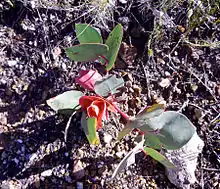Protea cordata
Protea cordata (heart-leaf sugarbush; hartblaarsuikerbos (Afr.)) is a plant species native to Southern Africa that grows on woody soils or in the soil.
| Protea cordata | |
|---|---|
 | |
| Scientific classification | |
| Kingdom: | Plantae |
| Clade: | Tracheophytes |
| Clade: | Angiosperms |
| Clade: | Eudicots |
| Order: | Proteales |
| Family: | Proteaceae |
| Genus: | Protea |
| Species: | P. cordata |
| Binomial name | |
| Protea cordata Thunb. | |
The red, bald-sheared trunk is unbranched and reaches a length of 500 mm. Brown, lance-shaped, scaly leaves appear at the base of the stem, and some stalkless, heart-shaped leaves zigzag along the tip, while others gradually shrink.[1]
Brown dry paper bracts form a cup – shape that surrounds a cream – colored flower with red tip, with an orange-brown flower at the base of the flower. A new trunk grows from the woody subsoil, while the old one dies after one or two years and is finally blown away. Each reversed fruit contains a single seed and is covered by a thick layer of green, brown or orange-brown leaves, covered with a thin, white, upturned, yellow, green or yellowish orange fruit.